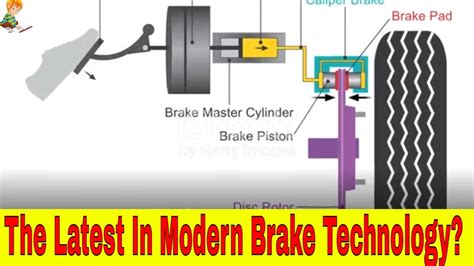The world of brake technology has come a long way since the early days of drum brakes and manual transmissions. Modern vehicles are equipped with advanced braking systems that provide improved safety, performance, and fuel efficiency. In this article, we'll delve into the world of brake tech, exploring the latest advancements, key components, and maintenance tips to help you master modern brake technology.
The Evolution of Brake Technology
Over the years, brake technology has undergone significant transformations, driven by the need for improved safety, performance, and efficiency. From the introduction of disc brakes in the 1950s to the development of anti-lock braking systems (ABS) in the 1980s, each innovation has built upon the last, shaping the modern braking systems we use today.
In recent years, the industry has seen the rise of advanced technologies such as regenerative braking, brake-by-wire systems, and autonomous emergency braking. These innovations have not only enhanced safety but also improved fuel efficiency and reduced emissions.
Key Components of Modern Braking Systems
Modern braking systems consist of several key components, each working in harmony to provide safe and efficient braking performance.
Disc Brakes
Disc brakes are the most common type of brake system used in modern vehicles. They consist of a rotor, caliper, and brake pads. The rotor is attached to the wheel hub, while the caliper houses the brake pads. When the brake pedal is pressed, the caliper applies pressure to the brake pads, which then frictionally engage with the rotor, slowing the vehicle.
Image:

Abs (Anti-Lock Braking System)
ABS is a critical component of modern braking systems. It prevents the wheels from locking up during hard braking, maintaining traction and control. ABS systems use sensors to monitor wheel speed and adjust brake pressure accordingly, ensuring a safe and controlled stop.
Image:

Electronic Stability Control (ESC)
ESC is a feature that enhances vehicle stability and control. It uses sensors to monitor the vehicle's speed, direction, and braking, making adjustments to the brakes and engine power to maintain stability.
Image:

Regenerative Braking
Regenerative braking is a technology used in hybrid and electric vehicles to capture kinetic energy and convert it into electrical energy, which is then stored in the vehicle's battery. This process not only improves fuel efficiency but also reduces wear on the brake pads and rotors.
Image:

Brake Maintenance and Repair
Regular brake maintenance is essential to ensure safe and efficient braking performance. Here are some tips to help you maintain your vehicle's brakes:
- Check brake pads and rotors for wear every 10,000 to 15,000 miles
- Inspect brake fluid levels and top off as needed
- Replace brake pads and rotors as recommended by the manufacturer
- Have your vehicle's brakes inspected by a professional mechanic annually
Common Brake Problems and Solutions
Here are some common brake problems and solutions:
- Spongy Brake Pedal: Check brake fluid levels and top off as needed. If the problem persists, have your vehicle's brake system inspected by a professional mechanic.
- Grinding Noises: Inspect brake pads and rotors for wear. Replace if necessary.
- Vibrations: Check brake rotors for warping or excessive wear. Have your vehicle's brakes inspected by a professional mechanic if the problem persists.
Gallery of Modern Brake Technology






FAQs
What is the difference between disc brakes and drum brakes?
+Disc brakes are more common in modern vehicles and use a rotor and caliper to slow the vehicle. Drum brakes, on the other hand, use a drum and shoes to slow the vehicle.
How often should I replace my brake pads?
+Brake pads should be replaced every 30,000 to 50,000 miles, depending on the manufacturer's recommendations and driving conditions.
What is regenerative braking?
+Regenerative braking is a technology used in hybrid and electric vehicles to capture kinetic energy and convert it into electrical energy, which is then stored in the vehicle's battery.
In conclusion, mastering modern brake technology requires a solid understanding of the key components, maintenance tips, and common problems. By following the tips and guidelines outlined in this article, you'll be well on your way to becoming a brake tech expert. Remember to always refer to your vehicle's owner's manual for specific maintenance recommendations and to consult a professional mechanic if you have any questions or concerns.
